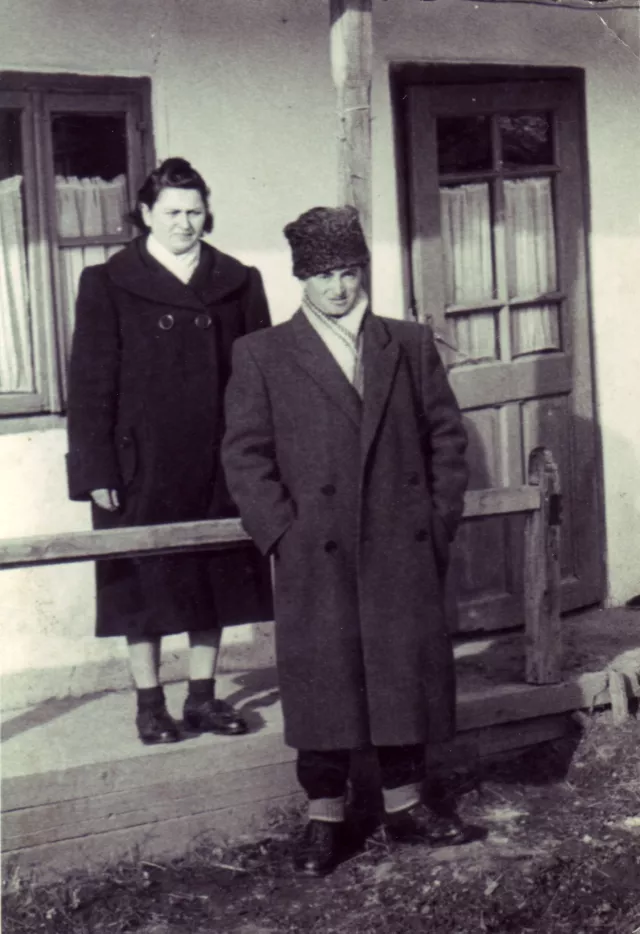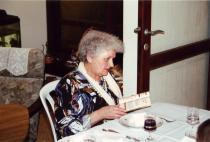This is I, Berta Finkel, with my husband, Mikel Finkel, when we were a bit younger. The photograph was taken here in Botosani, at the house where we lived on Zimbrului St.
I, Berta Finkel, was born in Sulita in 1925. I married here, in Botosani, in 1951. I met my husband through some relatives, namely one of my father's brothers-in-laws, Leon Segal. This uncle of mine was in the scrap iron business, and my husband was passing by, across that market, my uncle knew him, and told him: 'I have a niece, would you like to get married?' For he had 2 sisters who left to Israel, and he stayed here, and his parents were elderly people. And I came to Botosani, my aunt, Fremita, was still living here; I stayed at their place for a day or two, and I met him, somewhere downtown. I am old now, but I was beautiful back then, and I was dressed neatly, elegantly, and he liked me.
My husband was born here, in the city of Botosani. His name was Mikel Finkel, Mahal [Makl] was his Jewish name. He was born in 1925, just like me. He attended 4 grades here in Botosani, that was all. There was a Jewish school on Karl Marx St., that's where he went to school. And from where he lived, on Zimbrului St., it was very far for him to come home to eat. But there was a kitchen there, at the school, and, in order for him not to come home to eat lunch, he ate there. My father-in-law gave them beans, this and that, so that he could study. My husband said: 'I ate there until I entered 5th grade.' That was all. They wanted him to continue his studies, but there were no spots available, he couldn't fit somewhere, at a school, so that he could continue his studies. His parents were old, also, he started working this and that. What could he do? I used to tell him: 'You see, if you had gone to school, perhaps you would have married a girl that was more well-read, more refined. But since you didn't?'
I wasn't a member of the Communist Party, nor was my husband. I didn't have a job. We raised sheep. That's what my husband did for a living before we got married. We had a large garden where we lived, we also had an enclosure in the back, and he had room for the sheep. And there was this man, who didn't live with us, he only came during spring to milk the sheep. Then, around May, when sheep are put to pasture, they constructed a sheepfold, and we sent the sheep to the sheepfold. There, at the sheepfold, on the pasture, it was a different matter, it was out of the city. I used to go to the sheepfold myself, I went on foot, I sometimes brought my daughter along, even though it wasn't nearby. That's what I mean, each of us worked, for I don't know how to describe the work that I did. But I seem to remember we had many sheep. We had 20, 30 sheep. You couldn't keep too many sheep, for the number of sheep you could keep was very strictly regulated during the Ceausescu's regime.
We raised sheep until my husband died, and then we sold them, we stopped raising sheep. Ten years have passed since my husband passed away, he died in 1996. That's when we also sold the house where we lived in Botosani. We had 2 rooms there, the porch was in front of the house, and the kitchen was in the back. And we had to go out in the cold during winter, and we cooked there, for that's where we had the cooking stove and everything else. And in 1996 I moved in a block of flats where I live with my daughter.






























